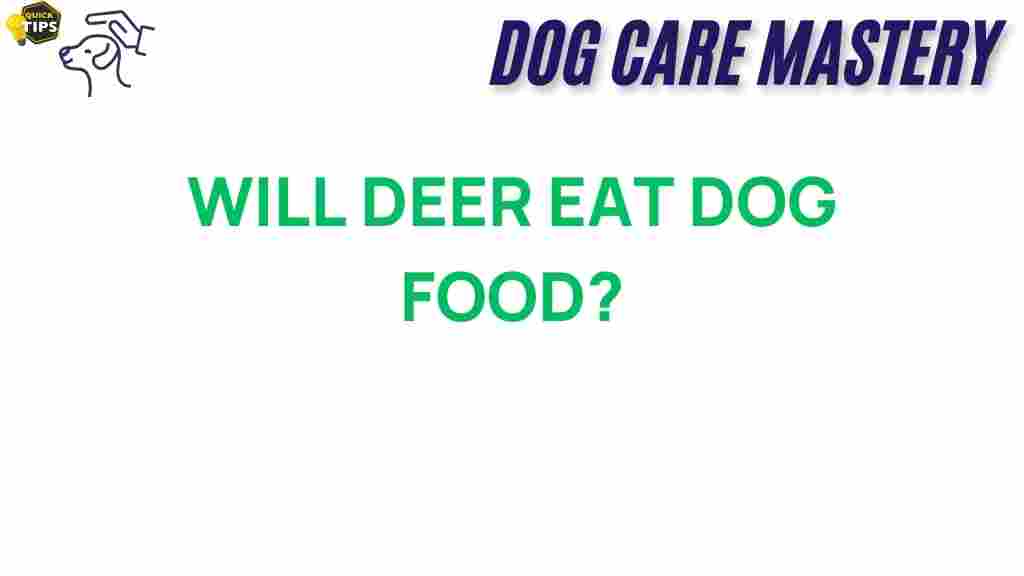The Surprising Truth: Will Deer Eat Dog Food? Understanding the Deer Diet
When it comes to wildlife and their eating habits, many people have questions about what they can and cannot eat. One common question that arises is whether deer will eat dog food. It may seem odd, but understanding the deer diet is crucial for both wildlife enthusiasts and pet owners alike. In this article, we will delve into the surprising truth about deer and their dietary preferences, and explore whether dog food fits into their eating habits.
Understanding the Deer Diet
The deer diet primarily consists of a variety of plant materials. These herbivores are known to graze on:
- Grasses
- Herbs
- Fruits
- Leaves
- Bark
- Twigs
Deer are selective feeders and their diet can vary depending on the season and their habitat. In spring and summer, they tend to consume more green leafy plants, while in fall and winter, they may resort to more fibrous materials like bark and twigs. The deer diet is designed to meet their nutritional needs, which includes:
- Protein
- Carbohydrates
- Vitamins
- Minerals
Understanding these dietary preferences is essential when considering whether deer would find dog food appealing.
Can Deer Eat Dog Food?
Now that we have a grasp of the deer diet, let’s address the million-dollar question: Can deer eat dog food? The answer is yes, but with important caveats. Dog food is primarily formulated for the dietary needs of canines, which differ significantly from those of deer. However, deer are opportunistic feeders and may consume dog food if it is available.
Here are some factors to consider:
- Ingredients: Most dog foods are composed of meat, grains, and various additives. While the protein content may be appealing to deer, the high levels of fat and certain artificial additives are not suitable for their digestive systems.
- Availability: If deer are in an area where dog food is readily available, they may try it out of curiosity or hunger, especially during harsh weather conditions when their natural food sources are scarce.
- Health Implications: Regular consumption of dog food may lead to digestive issues or nutritional imbalances in deer, which can result in health problems.
Why Deer Might Choose Dog Food
While dog food is not a natural part of a deer’s diet, there are reasons why they might be tempted to eat it:
- Hunger: In times of food scarcity, such as during winter or after a drought, deer may resort to eating whatever is available, including dog food.
- Curiosity: Deer are naturally curious creatures and may approach dog food out of sheer interest.
- Easy Access: If dog food is left outside, it can be an easy meal for deer, especially in suburban areas where their natural foraging options might be limited.
How to Prevent Deer from Eating Dog Food
If you have a pet and want to keep deer away from their food, here are some effective strategies:
- Feeding Location: Always feed your pets indoors or in a secure area that deer cannot access.
- Timing: Feed your pets at specific times rather than leaving food out all day. This reduces the chances of deer discovering the food.
- Secure Containers: Use containers that are deer-proof to store pet food.
Step-by-Step Process to Keep Deer Away from Dog Food
To effectively keep deer away from your dog food, follow these steps:
- Identify Feeding Areas: Determine where you usually feed your pet and assess how accessible it is to deer.
- Choose the Right Location: Select an indoor location or a fenced area that can keep deer out.
- Feed at Specific Times: Feed your dog at set times and remove any uneaten food promptly.
- Monitor for Deer: Keep an eye out for deer in your yard, especially during dusk or dawn when they are most active.
- Utilize Deer Repellents: Consider using deer repellents around your property to deter them from coming close.
Troubleshooting Tips
If you find that deer are still getting into your pet’s food despite your best efforts, consider these troubleshooting tips:
- Adjust Feeding Schedule: Try changing the time you feed your pet to avoid peak deer activity hours.
- Enhance Fencing: If you have a fence, ensure it is high enough (at least 8 feet) and check for gaps.
- Use Visual Deterrents: Hanging shiny objects or using motion-activated lights may scare deer away.
Conclusion
In conclusion, while deer may eat dog food if they encounter it, it is not advisable to let this happen regularly. The deer diet is specifically tailored to their natural foraging behaviors and nutritional needs, which do not align with the composition of dog food. Understanding the implications of allowing deer to consume dog food is crucial for maintaining both the health of the deer and the well-being of your pets.
By being proactive and implementing strategies to prevent deer from accessing dog food, you can protect your pet’s diet and health, while also respecting the natural behaviors of deer. For more information about deer diets and wildlife management, check out this informative resource.
Remember, while nature can be fascinating, it’s important to ensure that different species maintain their appropriate diets and habitats. Take care of your pets and the wildlife around you!
This article is in the category Behavior and created by dogcaremastery Team
